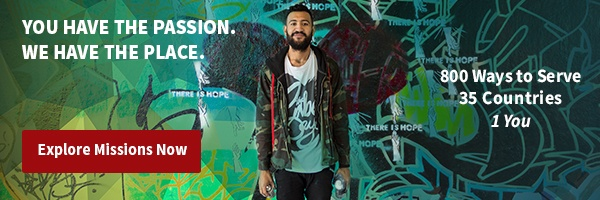It’s an apartment complex. It’s the gymnasium. It’s the Mother’s-Day-Out program down the street. It’s the restaurants, workplaces and community gatherings. It’s in the city. These are where the people of the world live, work and play, and that is where the believer lives, works and plays.
For most of us, when we think of cross-cultural ministry , our initial thoughts float toward airplanes, geographical borders and major unknowns. While this can be part of what it means to serve cross-culturally, it only paints the obvious picture. The more nuanced, yet immediate, definition could be walking across the street.
Before Serving the Nations, You Must Serve Your Neighbor
“I want to serve unreached people groups and minorities. I want to serve internationally. I want to go on a mission trip.” These are popular phrases I hear as a mobilizer, and I’m always deeply encouraged to hear the hearts of those who have hearts for the lost.
This is the natural outpouring of the gospel. We, the foreigners, have been bought by the blood of Jesus and brought into peace with our Father. Now, we go as torchbearers and peace-bringers with the news of salvation and redemption. This love flows from God’s love for us, our love for God and love for others, and it is to be celebrated and affirmed.
But I have a follow-up question for those who want to serve internationally: “Where are you serving locally? Now?” Most folks are invested in some kind of ministry — youth group, college, children’s, etc. Certainly, nothing is wrong with these ministries, and we need people serving in them. However, it’s a rare occurrence when it’s combined with cross-cultural living.
Our sovereign God has set in motion every people, language, and tribe since the beginning of time. Luke writes in Acts,
“ From one man He created all the nations throughout the whole earth. He decided beforehand when they should rise and fall, and He determined their boundaries. His purpose was for the nations to seek after God and perhaps feel their way toward Him and find Him—though He is not far from any one of us. ” ( Acts 17:26-27 NLT, emphasis mine)
God has determined to place people geographically near us so that we engage them, learn from them and reach them with the gospel of restoration.
Avoiding the “Project” Mentality with People
It’s also important to consider how we view our cross-cultural relationships in our communities. Do we view them as projects to complete, ministries to engage in or people to relate to? Much of the reconciling ministry of the gospel is done through the lens of genuine friendships, not outcomes. Deuteronomy 7:7 says,
“It was not because you were more in number than any other people that the Lord set His love on you and chose you, for you were the fewest of all peoples.” (ESV)
The Lord loved Israel because He chose to love them, not because of what they could give Him or what the outcome would be. They were not a project for Him, they were merely precious to Him. Maybe we could begin to look at our daily activities and schedules as serving our friends (who we happen to live cross-culturally with) instead of getting our “international experience” down before we flew across the world.
How to Make a Gospel Impact on the Nations in Your Neighborhood
And what exactly does it look like to serve in our neighborhood and city? What does it look like to consistently rub shoulders and break bread with those who work and play and rest where we do but aren’t like us?
It may take on the form of youth soccer. It could look like sitting down and working on the English language or sewing together. Some tasks may seem more structured while others are more organic. The point is that we would seek out where God is moving and working within our communities and join in.
The eagerness to go overseas is good. We should not shun the promptings of the Spirit to pursue international service if the Lord continues to confirm it. But neither should we neglect the opportunities to serve where we are, especially those who live within earshot and driving distance.
Here are some diagnostic questions to ask yourself as you seek the heart of God to serve internationally:
- Where in my city can I live and learn and experience cultures different than my own?
- What am I asking the Lord to teach me in regard to serving my neighbor? (Maybe we need to ask what the lawyer in Luke 10 asked: “Who is my neighbor?”)
- Am I learning a new skill, language or value that is inherent to another culture?
As we consider serving in foreign lands, let’s begin to work in familiar lands. Those of us who want to be thrust into the throes of the international ministry can survive, but our ability to thrive will be greatly enhanced as we engage with those who are not of our own culture but in our own culture.
Our Colombian neighbor, Ghanaian classmate or Thai boss are great places to start learning about what cultures and peoples different than our own are like. Begin to ask questions, inquire, play with their kids, eat with them (accommodating to new times and food groups), enjoy their company and be willing to learn. Nothing says, “I love you” like learning and growing from others instead of teaching them the way you do things.
Let us be people who are faithful and available where we are, seeking to serve our cities that are populated with diversity and cultures. God is working among the nations in our neighborhood. Let’s join Him.





















